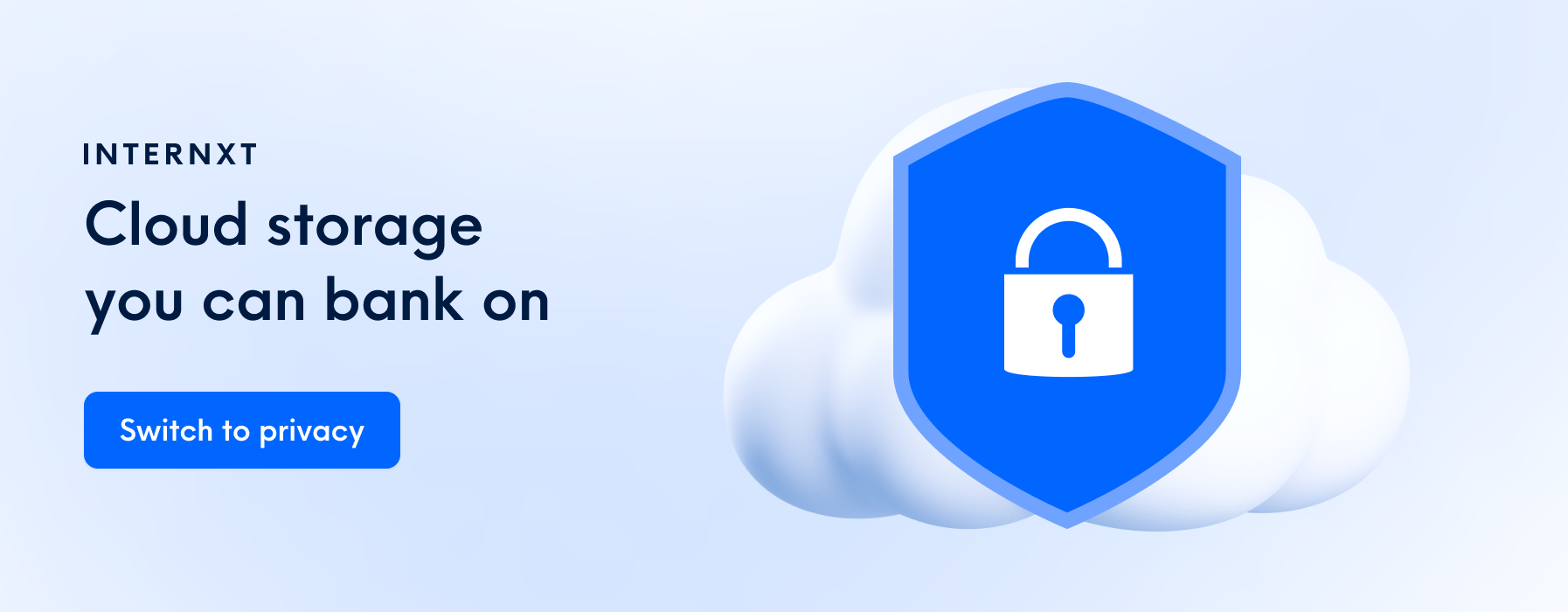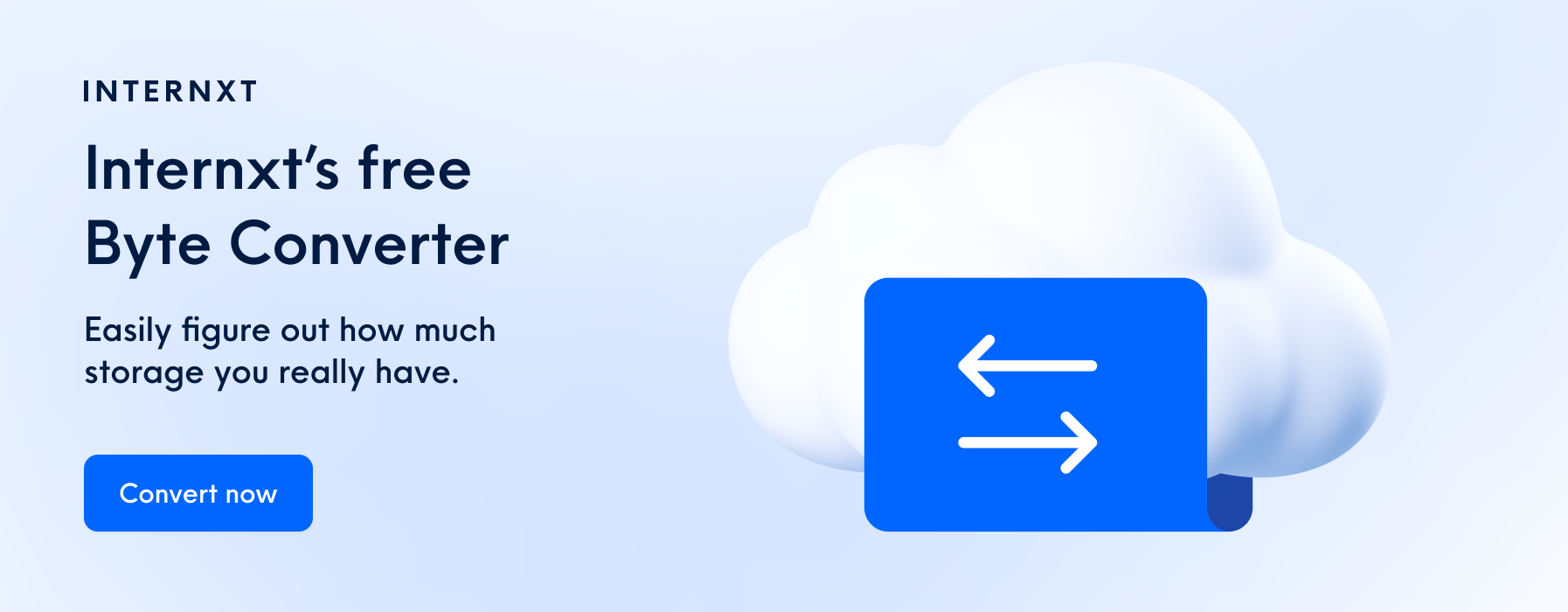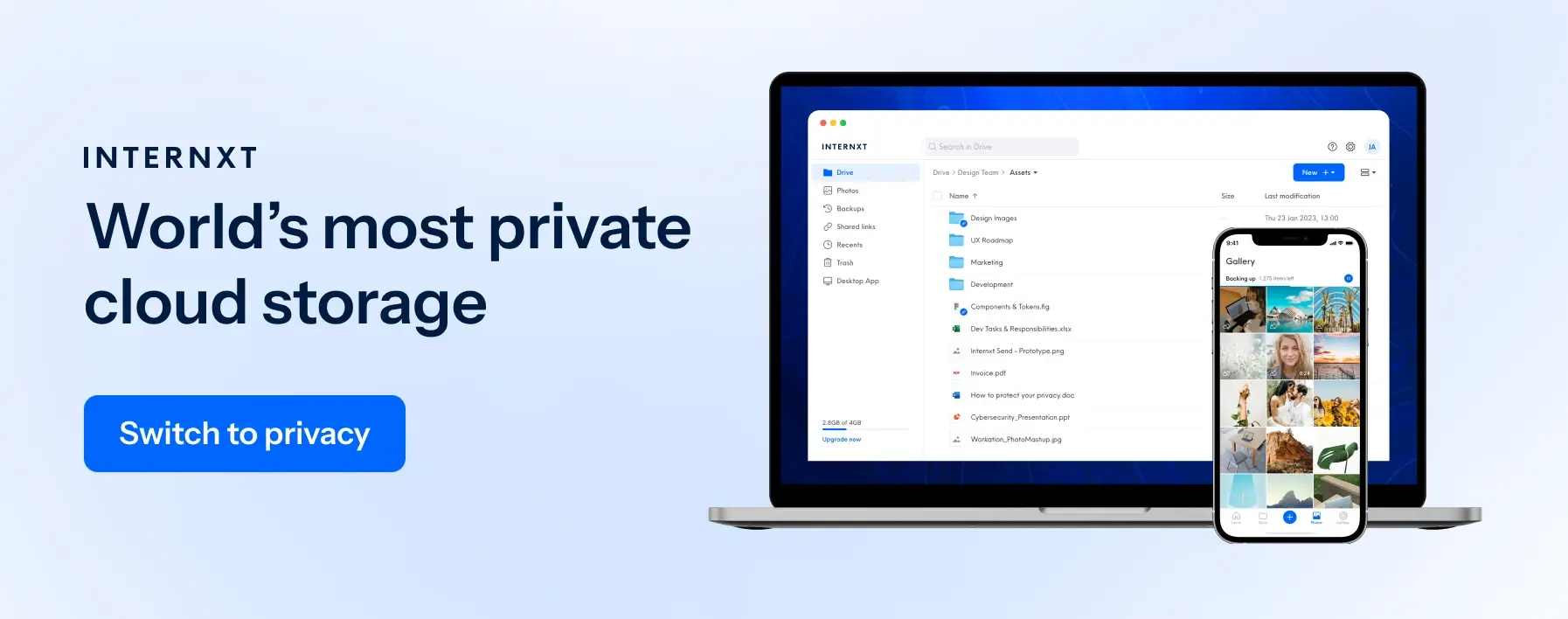What the Heck Is Hybrid Cloud Storage and Why It's the Smart Choice

Cloud are on the rise! User concerns about data storage security and their need for quick access to databases are driving the development of cloud technologies. At the moment, the most progressive and convenient solution is hybrid cloud storage.
The significant current popularity and predicted growth in demand for hybrid cloud technologies in the near future are not just speculation. They are evidenced by research. In 2021, the market for hybrid cloud storage was estimated at $85 billion, and by 2027 it will be $262 billion. Hybrid cloud storage is no fad and the amount of investment being pumped into it makes it clear that it's here to stay.
To understand why hybrid storage is increasingly becoming the storage solution of choice, how it is used, and what opportunities it provides, you first need to understand what hybrid cloud storage is.
What Is Hybrid Cloud Storage?
Hybrid clouds combines public cloud platforms, private cloud structures, and on-site IT systems, offering orchestration, control, and the ability to move applications between them.
Such cloud storage is called hybrid because it uses both private and public cloud systems. If the computing model uses at least one private cloud and one public cloud, by definition it is hybrid storage.
Hybrid cloud storage is one of the common types of cloud storage businesses use. It creates a unified and versatile distributed computing system where organizations can use either traditional or cloud-native processes on the most suitable computing model.
These hybrid solutions provides a single operating model by coordinating cloud infrastructure extensions and process integration. This coordination ensures that the data load is distributed and managed across both environments and makes it easier to move loads from one type of storage to another and vice versa.
With hybrid cloud storage, organizations can leverage modern IT technologies and strategies, reduce costs, build applications, drive digital transformation, and enhance data storage security.

Benefits of Hybrid Cloud Storage
While hybrid costs may be low, a company cannot expect significant savings right away. It must be understood that only some IT specialists can work with enterprise hybrid cloud systems. Therefore, saving big is not be possible, at least in the beginning stage of connecting and implementing the system.
That said, long-term savings are only one of the hybrid cloud perks. For each organization and company, enterprise hybrid cloud systems has many other benefits, such as application modernization, cybersecurity, and increased flexibility. The major benefits of hybrid cloud storage are:
Load sharing
No need to rewrite programs or change algorithms. Migration is managed using the same tools and processes as private or public cloud storage workflows.
Scalability
Using hybrid clouds lets you quickly and efficiently expand your data storage space. If the company's growth is intensive, then it is hybrid solutions that are optimal for it.
Cost savings
Using private or local storage means you must purchase expensive equipment if you need to expand it. The use of hybrid systems allows businesses to save on expansion, which is especially important for small and medium-sized businesses.
Reducing burden on IT specialists
Using hybrid clouds makes it possible to reduce the number of routine daily tasks IT employees need to manage on a daily basis.
Functioning Principles of Hybrid Cloud Storage
The advantages of hybrid cloud storage boil down to the principles of operation of each of their individual parts. Therefore, we must further consider a hybrid system with an understanding of how this cloud storage works, and its primary components functions.
Private cloud storage
The first part of an enterprise hybrid cloud system is private cloud storage. Private cloud storage is a cloud-based infrastructure that is intended to be used by a single company. Two forms of equipment are typical for private storage facilities: purchase and rental.
A company can equip its own service room, store all work processes and data, or rent hardware from a provider. A typical example of this is NAS or Network-Attached Storage.
Generally, it doesn't matter what kind of equipment a company uses, whether its own or rented. However, it is critical that its cloud environment is for the business or organization's use only and that no other parties can use or exploit it.
Private clouds are used when a company needs specific equipment to implement its solutions. This may also apply to the configuration of the equipment. By default, such applications cannot be implemented in the public cloud, so specialists create their own environment to solve IT problems.
Private clouds are also used to meet security requirements. In some cases, the requirements for storing and processing data cannot be implemented in public repositories, so companies must create or rent a ready-made private cloud that meets specific criteria.
There are also a few niche cases in which the use of private cloud storage makes more sense than other options.
Public cloud storage
Public cloud storage, in this case, belongs to a provider company who in turn leases its resources to users, the number of which depends on the provider's capabilities. Clients or users can typically rent disk space, RAM, and data processing power.
Public cloud storage is mostly used for applications, websites, and online stores. Small companies rent managed vps hosting for their solutions.
They also rent shared hosting solutions because this makes it possible to save on the purchase of expensive equipment both for launching the product and for its expansion because if you need to add capacity, you can always rent additional resources from the provider;
Public cloud storage is also used frequently for development and testing. A virtual infrastructure allows implementing environments for developing, testing, and launching products. In this case, the public cloud's main advantage is scalability. Suppose a particular resource is insufficient for the implementation, such as RAM. In that case, it can be rented additionally, and after the work is completed, it can be curtailed to avoid paying for extra capacities.
These are just a few general examples to understand how public cloud systems are used, there are also several other specific use cases. Now, let's look at how hybrid cloud storage works and their architecture.

Use Cases for Hybrid Cloud Storage Systems
The peculiarity of hybrid cloud systems is that they imply the simultaneous use of private clouds (leased or owned) and public ones . At the same time, only one party or entity has access to these storage systems and determine their use.
Most often, companies gradually come around to the use of hybrid clouds. They start with their own server rooms, and with the growth of tasks, they eventually rent public cloud spaces to avoid overspending. Then to make their total system easier to handle they rework their cloud into a functional hybrid model. That is, both the private and public clouds are combined into one system and can be managed as a single entity.
Scaling a system quickly
Many companies handle seasonal loads of data. For example, if a company holds a promotion or a sale, the load on its capacity increases exponentially for a short period of time. Another example is the reporting periods in some firms, during which there is also an increase in workloads.
At these peak times, you can deploy the necessary capacities in the public cloud, and then when the load drops, turn them back. It is also beneficial that there is no need to pay for equipment and capacities that are idle the rest of the time. When necessary, use and pay. When the demand has dried up, turn off and save.
Disaster recovery
With proper distribution of IT resources in the private and public cloud, "warm" recovery is greatly simplified. The primary resource is hosted on a private cloud to make this possible, while copies of services and data are stored in the public cloud. If necessary, IT specialists have quick and convenient access to lost data.
Testing systems or applications
Before application or online services are released to the public, they must be tested. Hybrid cloud storage is is up to this task, especially for applications with an untested loads. Public storage especially is ideal for launching and reworking web products.
Security requirements
Most often, meeting security requirements is forced on businesses by privacy laws, regulators provision, or security consultant. You can use secure cloud storage for general solutions, including workloads, to create a specific private cloud configuration, transfer all critical services there, and transfer the rest of the loads to a standard public cloud.
Managing Hybrid Cloud Storage
All areas of use of private and public cloud storage are implemented through a cloud resource management platform. Using the platform is the only way to manage both the private and public cloud storage systems as one. In fact, this is the only communication channel and the unification of two repositories into one network.
Communication can be implemented in several ways, the most popular of which are direct connection or through a virtual private network (VPN).
The provider provides a direct connection by creating a direct connection channel between private and public cloud storage. This method is distinguished by its reliability. A VPN is used to ensure the best interaction speed. With its help, a special encrypted channel is created, providing a high interaction rate between both segments of the hybrid cloud storage.
Having figured out what hybrid cloud storage is, what it consists of, its advantages, and how to manage it all, you're now probably wondering about the downsides or possible problems that can pop up when using hybrid clouds.
Using Hybrid Clouds: Problems and Solutions
Of course, everything could be better, especially regarding IT technologies. When using hybrid cloud storage, problems are always possible. Below are several of the most common issues associated with hybrid systems:
Complexity of "set up"
Establishing the management and monitoring of hybrid clouds is more complex than separated private and public systems. Most often, specialists need to be involved to set a communication channel, coordinate capacities, and set other parameters, but these specialists will need to be paid a lot and you should to be prepared for this.
Staff costs
To maintain hybrid clouds, you will have to hire local specialists or improve workers' skills. This may be expensive, but it is not comparable to spending on expansion and support, as well as downtime of your equipment.
Need for additional services
Most often, further security services are required to protect data at the time of transfer from one storage to another.

Poor providers
Problems can be very different with various providers. Be ready for everything from the discrepancy between the declared companies by the provider of capacities and the actual ones to the refusal to provide additional resources during periods of peak workloads.
Outages
If you only use a private cloud, hardware can fail, and the same can happen with your provider. Now imagine a system with several components, each of which can fail. For example, a breakdown may happen to you, the provider, at different times and at the same time, and the communication channel may also be lost. You need to be prepared for this.
Since there is no perfect system, hybrid cloud storage should only be considered a panacea for some ills. On the other hand, many solutions of large enterprises can only be implemented with their use. Therefore, it's wise to focus on optimizing your hybrid cloud system to minimize the likelihood of problems.
How To Mitigate the Disadvantages of a Hybrid Cloud
Not all the disadvantages of using cloud systems can be ironed out. But with the right approach and knowledge of the nuances, many problems can be avoided.
Store latency-sensitive software parts on a private cloud
We are talking about databases and caches. They should be stored together with the main software of the application.
Know it may be impossible to bring vital parts of an application to a public cloud
If there is a failure at the provider or in the communication channel, the application will stop working.
Anticipate possible scaling problems
They are often associated with different hardware performances in other parts of the hybrid cloud. Unfortunately, it will not be possible to eliminate the problem completely, but you can reduce its impact on work to a minimum.
Consider the physical location of the systems of the hybrid cloud
The closer the physical components are, the less chance of delays. This is a very significant problem since hybrid clouds are especially in demand in companies with a wide geographical presence, and it is not always possible to ensure the proximity of all parts of the hybrid cloud to the data center.
Monitor the use of the same technologies in both clouds
For example, the use of the same gateways.
Avoid using the same virtualization technologies
Try to negotiate with the provider on the migration of virtual machines so that there is no need to reinstall.
Use the public cloud as a backup
If you need to scale a private cloud, you can move some applications or projects from it to the public storage. In this case, the hybridity of the system is supported only conditionally, but often such a solution is optimal.
Typically, the transition to hybrid technologies is the only right decision for companies. In 2021, 78% of companies will use a hybrid or multi-cloud environment. But the implementation of the transition requires attention and knowledge.

Is Hybrid Cloud Storage Right For You and Your Business?
It is a hybrid cloud system that solves many problems companies face with workloads, growth, and optimization. Definitely yes!
With companies like Internxt, you can get the best of both worlds if you have a NAS system, as we now offer NAS support for Synology and QNAP devices for all Ultimate plans.
Combining the benefits of private and public clouds provides many opportunities for companies. Are there any issues with the hybrid cloud? They arise, but they are not so critical and solvable, especially when compared with the costs of using and expanding only a private cloud and the loss of all capacity due to provider problems only when using a public cloud.
Should you be all in on hybrid systems and should your business move to the cloud? Yes, it’s worth it, especially for companies that really need software and application developers, large companies with numerous branches and complex IT solutions.
Hybrid cloud systems are currently the most versatile solutions, and the above statistics indicate that their market will grow significantly yearly. So what is hybrid cloud storage? Now you know!

